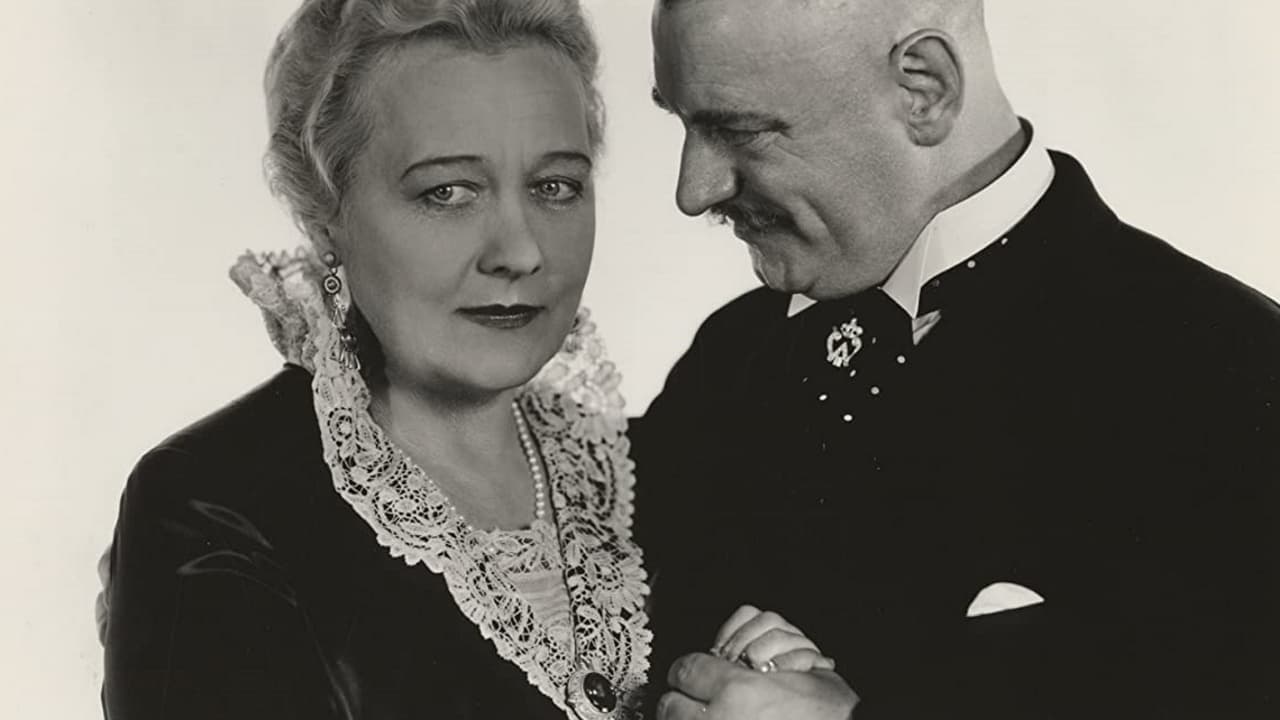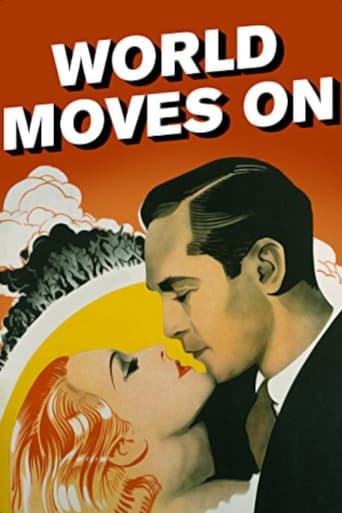

Am i the only one who thinks........Average?
... View MoreExcellent characters with emotional depth. My wife, daughter and granddaughter all enjoyed it...and me, too! Very good movie! You won't be disappointed.
... View MoreClose shines in drama with strong language, adult themes.
... View MoreBlistering performances.
... View MoreFor a John Ford film this one is usually not mentioned in any retrospectives I know concerning his career. For a film that is internationalistic in scope it gets sadly neglected.Another reviewer compared The World Moves On to Cavalcade which came out a year earlier. For me this film most closely resembled The House Of Rothschild only instead of money the commodity is cotton and in the 19th century. In some places cotton was considered a kind of currency like in the American south. In 1825 the American family Girard merges with the British Warburtons and then has other sons settle in France and Germany just like Nathan Rothschild's kids as early proponents of globalism. After an 1825 prologue the action skips to 1914 where Sig Ruman of the German branch is hosting a big blowout with nary a thought to a possible war breaking out. War and the Roaring 20s type materialistic peace that followed are what is dealt with.By the way also watching this film I did wonder just how the combine managed to weather the American Civil War. But that was never mentioned.The film focuses on Franchot Tone of the American branch and Madeleine Carroll of the English Warburtons. They marry and she jilts Reginald Denny of the German branch in the process. Then Tone almost on a lark enlists in the French Army. The family with losses both financial and personal carries on though.Shoehorned into the film is Stepin Fetchit in a real travesty of a role. He's the family retainer as he usually is. Here he spots some French Senegalese African soldiers in dress uniforms and he thinks it's a lodge and wants to join. Of course he's eagerly recruited. Today's viewers might not realize but the popular Amos N' Andy radio show had their protagonists as members of the Mystic Knights Of The Sea Lodge. That reference to a lodge would not have been lost on a 1934 viewer. Stepin Fetchit's role adds zero to the story and it's more offensive than usual.Best part of The World Moves On are the battle scenes in World War I. They are not glamorized in any way, hardly like one of Ford's cavalry epics.I rate The World Moves On as low as I do because of Stepin Fetchit. Had he not been there this would far higher on John Ford's list of films for quality.
... View MoreThe World Moves On (1934)** (out of 4)Flat look at two families, the Warburtons and the Girards, who are bound by marriage in 1825 and form a business that places parts of the family in England, America and Germany. All is well until WWI breaks out and soon the families are torn on all issues. I've read numerous reports saying that director John Ford never cared for this film and rumor has it that Fox was really hounding him to film screenplays the way they were written and not to go so far off track. Rumor has it that Ford did exactly that here and turned in a pretty lifeless movie just to prove a point to the studio. Of course, this has never been proved to my knowledge but if you watch the film it's easy to see why this might be the case. I've seen dozens of films from the legendary director and there's no question that he's made some duds throughout but THE WORLD MOVES ON should have been a classic but the end result is so lifeless that you can't help but think there was something going on behind the scenes. Ford has always been great at showing patriotism but that's missing here and it plays an important part of the picture. There are many actions scenes scattered throughout but none of them contain any energy and they come across so flat that it seems like they just set the camera up and started shooting without trying to do anything special. This is especially true during some horrendous comedy moments with Stepin Fetchit, which are just so embarrassing that you really wonder what the director was thinking. I know Fetchit appeared in several Ford films and the image that he plays rubs a lot of people the wrong way but no matter how you view it the way the character here is used is just bad. Performances are pretty good from the leads (Franchot Tone, Madeleine Carroll, Reginald Denny) but they're certainly letdown by the direction. The look of the film is quite good and there's a very interesting story here but sadly it just never comes to life. I think with more care there's a classic movie here.
... View MoreThis movie reminds me a bit of the best picture film, "Cavalcade", that was made a year before "The World Moves On". Both stories are set over a very long time period and involve a wealthy family during good times and bad--the bad being WWI. However, there are also a lot of differences--enough that it's well worth seeing both films.The film begins in the early 19th century. At the death of a so-called 'Cotton King', his will is read and it gives amazingly detailed instructions about his estate. To satisfy the conditions of the will, the family must make a business merger and then send its family members to set up a business empire in the major industrialized nations at the time--France, Prussia (later, to make up a large part of Germany), Britain and, of course, the United States. Through the decades, the family ties remain strong--even after there are distinct lines of the new family that speak different languages. The idea is that despite national interests, the family and the company come first. However, this is all complicated 90 years later when WWI arrives. And, surprisingly, the film continues from the end of WWI to the Depression and its impact on the family.The film has excellent production values and clearly was a project that Fox Studio heaped a lot of money on--with lots of fancy sets, an up and coming director (John Ford) and a pretty good cast headed by Franchot Tone and Madeleine Carroll. For the most part, the writing was also first-rate and the film quite enjoyable. There were only a couple things I really disliked about the film. First, subsequent generations of family members are played by the same actors in several cases--as if descendants look EXACTLY like their parents, grandparents or great-grandparents. This is a stupid Hollywood cliché--as this does not happen in real life--even with families where incest is all the rage!! Second, for 'comic relief' for the WWI scenes, Steppin Fetchit is cast--even though he has NOTHING to do with the movie. And no, he does not play the 'black sheep' of the family! He is simply a walking, talking negative racial stereotype that was very popular in the 30s but which makes almost everyone cringe today (and it should). Also, the notion of a need for COMEDY during WWI is brainless and misguided to say the least! What part of 11,000,000 war dead is funny?!Now you should be able to look past these two problem areas with the film and if you stick with it, the movie is pretty amazing for its scope, its very brutal scenes of warfare (some of the most harrowing of the era, in fact) and its rather non-partisan stand--which was quite the rage in the early to mid-1930s--when most Americans had come to accept that this war had no good guys or bad guys--only many victims. Of course, WWII and the rise of Hitlerism in the years following this film would change this attitude considerably. Still, it's a mostly forgotten fact that practically all films about WWI made in America during the 1930s were very critical of the war and took a neutral stance on it--as was also true of many of the films in France (such as "Grand Illusion" and "J'Accuse!") as well as Germany up until the Nazis took control ("Westfront 1918"). Plus, I was amazed that the movie dared to criticize the rise of nationalism and fascism in the 1930s--they were correct, but Hollywood (aside from this film) pretty much ignored this until AFTER WWII had already begun!By the way, you probably could guess that I am a history teacher and film buff--hence all this background material that you might find interesting. And, speaking of this, history teachers should particularly appreciate this well-made film.
... View MoreAside from a couple of shots, it would be almost impossible to tell that John Ford directed this if you didn't see the credits. There is an astonishingly good combat sequence, but apparently most of this footage comes from a French film that Fox bought a few years before Ford made World in '34. Nonetheless, the combat stuff is breath-taking, and very well integrated with studio footage of the principals. Stepin Fetchit has some good lines. Some nice compositions show that Ford (or his cinematographer) wasn't totally disengaged. The multi-generational love story with its mystical overtones seems totally out of character for Ford, but the opening and closing shots of Christ on the cross remind us of Ford's lifelong religiosity.
... View More